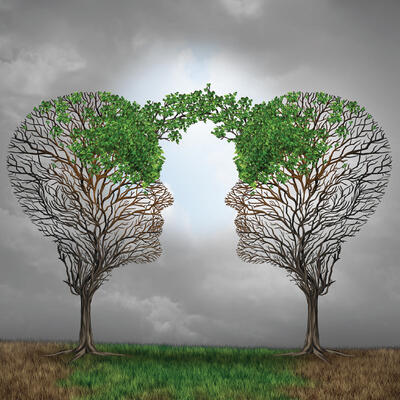Climate One TV: Mind Over Chatter
Guests

Leslie Davenport

Renee Lertzman
Summary
We all know about the environmental and physical effects of climate change. But what about its impact on our mental health? According to some psychologists, their patients who report trouble sleeping, changes in appetite, feelings of dread or hopelessness, could be suffering from climate anxiety.
Leslie Davenport is a clinical psychotherapist who practices in San Francisco. “I’m starting to notice in my practice that sometimes people come in with ambient anxiety,” she reports. “They’re just more distressed, even if they haven't always connected the dots about why.”
In her book Emotional Resiliency in the Era of Climate Change, Davenport likens her patients’ feelings about climate change to the five stages of grief.
“Really what we're talking about is any kind of loss,” she says. “Loss of identity, loss of lifestyle, loss of environment…the degradation we’re talking about can trigger a very similar process.
“Denial, anger, sadness, bargaining have [their] versions of what it might look like in the climate world,” Davenport continues. “But the most important part is underneath that -- making room for the emotional landscape that accompanies this experience, so that we can attend to what's happening with more of ourselves instead of investing so much energy at keeping the feelings at bay.”
“The whole topic of loss and grief and feelings, it freaks a lot of people out,” agrees climate engagement strategist Renee Lertzman. But avoiding the pain won’t make it go away.
Lertzman and Davenport are among the psychologists who recognize that “we’ve got to cut through the confusion and bring in some actual grounded psychological expertise and insight into how we understand this work -- which is that there is a spectrum, that there are strength and power in our ability to stay present with our feelings that we won't get stuck and lost in a hole of despair and gloom.”
Mastering those feelings is one thing. What about sharing them with others?
Bryant Welch is the author of State of Confusion: Political Manipulation and the Assault on the American Mind. He advocates starting a conversation with those who may not necessarily agree with you about the reality of climate change. And don’t just talk, says Bryant – be sure to listen as well.
“When people are listened to it is a very unusual experience for them, and a very powerful experience for them,” he says. “And when you connect with someone in these kinds of conversations that environmentalists are now talking about…it is stunning the impact it has on the person being listened to.”
The more we bring our anxieties out of the shadows, Bryant maintains, the more we can harness hope for the future.
“There's a saying, if you can name it you can tame it,” he says. “Now there’s a lot of optimism in that. And it really does produce health, mental health in and of itself.
“And so I've never been more optimistic. I don't know if we’re gonna survive,” he adds with a laugh, “But I’ve never been more optimistic.”
#letstalkclimate
How to talk about Climate Change 1:51
Talking to another mind 5:34
People have a "worry budget" 11:46
Climate Denial 16:39
Correlation between heat and human aggression 25:25
